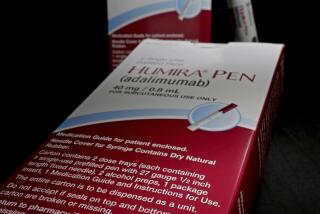AbbVie reconsiders Shire purchase, cites tax inversion crackdown
- Share via
Reporting from washington — New tax provisions designed to discourage U.S. companies from moving their headquarters to overseas tax havens may be having an effect.
Drug maker AbbVie Inc. said Wednesday that it is reconsidering its planned purchase of European rival Shire and relocation to a British isle tax haven in its effort to minimize what it pays in U.S. corporate taxes.
The $52-billion pharmaceutical deal could be the first major casualty of a crackdown by the Obama administration on so-called tax inversions, in which an American company buys a smaller rival in a lower-tax nation and moves its headquarters there.
The maneuver has become more common as companies decry the lack of congressional action to reduce the 35% U.S. corporate tax rate, the highest among the world’s most advanced economies, to help them compete better internationally.
Faced with a growing number of inversions, Treasury Secretary Jacob J. Lew last month made some technical revisions related to the tax code to “significantly diminish the ability of inverted companies to escape U.S. taxation.”
The Treasury Department eliminated some techniques, such as so-called hopscotch loans that U.S. companies with headquarters abroad use to gain tax-free access to some earnings.
Lew said at the time that for some firms, the changes would “mean that inversions no longer make economic sense.”
Treasury’s changes are part of strong reaction by U.S. and European leaders to increasing efforts by corporations to dodge corporate taxes in their homelands. U.S. firms hold $2 trillion in cash in overseas accounts, and the European Union has said its member nations are losing about $2 trillion a year to individual and corporate tax avoidance schemes.
AbbVie’s decision to review its takeover and relocation to the British island of Jersey — which has no corporate income tax — comes a day after Ireland bowed to U.S. and European pressure and said it would close one of its tax loopholes that had helped particularly American technology firms shelter income from U.S. taxes.
Treasury’s recent changes led AbbVie executives to worry that the North Chicago company’s plan to acquire Shire and to create a pharmaceutical giant on Jersey might no longer make financial sense.
A Treasury spokeswoman said the department doesn’t comment on specific business deals.
Sen. Richard Durbin (D-Ill.) said he was encouraged by AbbVie’s decision to reconsider its offshore move in light of tax rule changes that he and other Democrats had urged the Obama administration to make.
“When corporations choose to invert and don’t pay their fair share of taxes, they leave the rest of us to pick up the tab,” Durbin said Wednesday. “That isn’t right, and I hope that more companies will see the light.”
AbbVie said late Tuesday that its board of directors would reconsider the recommendation to its shareholders to approve the deal for Shire.
“AbbVie’s board will consider, among other things, the impact of the U.S. Department of Treasury’s proposed unilateral changes to the tax regulations ... including the impact to the fundamental financial benefits of the transaction,” the company said.
AbbVie notified Shire’s board that it was reconsidering the deal. AbbVie’s board plans to meet Monday to discuss it.
Under the deal, the new company would have its headquarters for tax purposes on Jersey, a well-known tax haven where Shire is incorporated. Shire, though, is based in Dublin, Ireland.
AbbVie said the move would reduce its overall effective tax rate from 22.6% last year to 13% in 2016. The company, based in North Chicago, Ill., would retain its U.S. presence.
Shire said Wednesday that its board believes AbbVie should go ahead with the acquisition. Shire noted that under the terms of the proposed deal, AbbVie would have to pay a $1.6-billion break-up fee if it backs out.
A week after Treasury’s Sept. 22 changes in tax rules, AbbVie Chief Executive Richard Gonzalez sent an email to Shire employees expressing optimism in the deal. “I’m more energized than ever about our two companies coming together,” he wrote.
Investors weren’t so sure.
Shire shares plummeted $17.87, or 21.8%, to $63.96 on Wednesday in trading in London. AbbVie shares fell 50 cents, or 0.9%, to $54.63.
The Obama administration has been highly critical of inversions, saying U.S. companies were avoiding paying their fair share for roads and other infrastructure as well as federally funded research and protection of intellectual property rights.
Shortly before the AbbVie-Shire deal was announced, Lew called for companies to show “economic patriotism” and not try to shirk their U.S. tax bills.
But those calls did not stop companies from pursuing inversions.
In August, Burger King Worldwide Inc., based in Miami, announced it would reincorporate in Canada after the purchase of Tim Hortons Inc.
Burger King said the decision to put the combined firm’s headquarters in Canada was not driven by that nation’s lower tax rate but because Canada would be its largest market.
More to Read
Inside the business of entertainment
The Wide Shot brings you news, analysis and insights on everything from streaming wars to production — and what it all means for the future.
You may occasionally receive promotional content from the Los Angeles Times.









